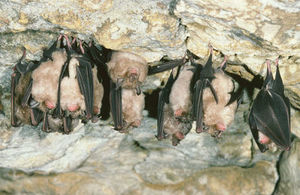Bat conservation panel appointed
Bat Expert Panel will help shape future bat conservation.

Copyright Natural England
Natural England has appointed a new expert panel to help shape the future of bat conservation in this country.
As Natural England considers an innovative approach to licensing across a range of species, it is looking at how the implementation of protected species legislation could be improved in its delivery for conservation and ensuring that regulation is applied proportionately. The Bat Expert Panel will provide a forum for generating ideas and testing Natural England’s thinking with the aim of securing better outcomes for bats and stakeholders.
The panel is chaired by Natural England’s Chief Scientist, Dr Tim Hill, and includes experts with a strong track record of research or achievement in bat conservation from across academic, commercial, NGO and statutory sectors. It will shape Natural England’s bat reform programme and help to ensure the reform projects are informed by the best available evidence, and based on sound judgement of what is achievable. In this way it will play an important role in developing consensus and partnerships for bat conservation.
Dr Tim Hill said:
The number of licence applications for bats received by Natural England is greater than for other species groups and is increasing. The panel will look for ambitious change to improve bat conservation and where evidence allows, make it work positively for everyone that it affects.
The legal protection of bats commenced following the Wildlife and Countryside Act 1981 and was further strengthened by the Habitats Directive and subsequent Conservation of Species and Habitats Regulations. Since this legislation has been in place, national monitoring data suggests populations of most bat species have been stable or increasing although this is recognised as being set against large-scale historic declines. This improvement for certain bat species may be due in part to successful implementation of this legislation.
Over this time period considerable change has happened. The bat conservation movement has developed enormously and survey technology has moved on, advancing our understanding of bat ecology.
The members of the panel are:
- Professor Kate Jones - Professor of Ecology and Biodiversity, University College London
- Professor Paul Racey - Emeritus Professor, University of Aberdeen
- Dr Matt Zeale - Research Associate and Lecturer, University of Bristol
- Professor Fiona Mathews - Professor of Environmental Biology, University of Sussex
- Dr Stuart Newson - Senior Research Ecologist, Population Ecology & Modelling, British Trust for Ornithology
- Dr Carol Williams - Director of Conservation, Bat Conservation Trust
- Paola Reason - Technical Director, Arcadis
- Jean Matthews - Former Mammal Ecologist, Natural Recourses Wales. Retired.
- Dr Stephanie Wray - President of CIEEM, Partner at Tyler Grange
- Dr Peter Shepherd - Partner at BSG Ecology